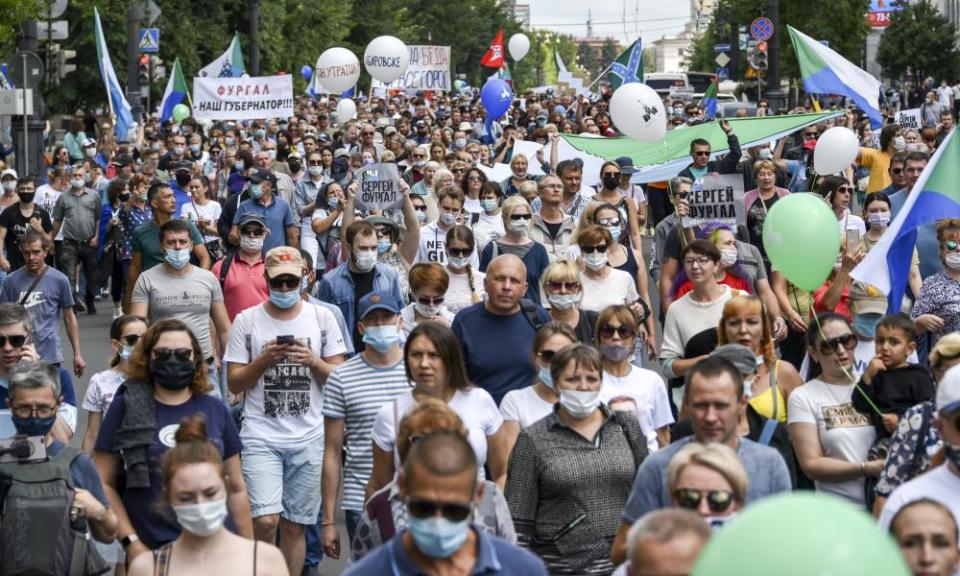The Observer view on anti-Kremlin protests in Siberia

After Vladimir Putin pushed through constitutional changes enabling him to remain as Russia’s president until 2036, most people assumed that, like it or not, he was here to stay. But residents of the city of Khabarovsk, on the eastern edge of Siberia, have different ideas. They have been demonstrating each weekend since July, calling, among other things, for Putin to resign. “Down with the tsar!” is one of their more pointed slogans.
Outbreaks of provincial unrest over issues such as pensions, food prices and environmental pollution are not uncommon in Putin’s Russia. But the turmoil in Khabarovsk is exceptional and potentially significant. So far, at least, the security forces have not attempted to suppress the protests, which has raised eyebrows in a country where public challenges to the Kremlin’s power usually end in a brutal flurry of police batons.
One possible explanation for this restraint is that officials hope that distant Khabarovsk province, separated from Moscow by 3,800 miles of mountains, ancient forests and several time zones, can simply be ignored. State media have avoided all mention of the unrest. More intriguing, however, is the suggestion that Putin cannot trust local police forces and national guard units to implement a crackdown.
To understand why such mutinous thoughts may have real traction, a glimpse of Siberia’s history helps. The tsars conquered it but struggled to subdue it. Its indigenous peoples never knew serfdom. The ethnic Russians who colonised it were tough-minded settlers, entrepreneurs and explorers, many of them descended from convicts sent to penal camps. A majority are Protestants, not Russian Orthodox. In 1918, Siberia briefly declared independence, before the Bolsheviks seized back control.
In other words, the people of Russia’s far east, whose homes are closer to the US and China than to Moscow, are a hardy bunch who do things their own way. So when Putin sacked Khabarovsk’s popular governor, Sergei Furgal, charged him with murder and replaced him with an apparatchik with no local links, they refused to accept it. Protests in Furgal’s support have since taken on an insurrectionary tone.
Putin's weakening of federal structures has had the unintended effect of encouraging Siberian regionalism
Kremlin officials reportedly suspect that sympathy for Furgal extends to locally based security forces, hence their softly-softly approach. Yet the affair also sheds light on Putin’s methods of governance. Most residents dismiss the 15-year-old murder charges as specious. They allege instead an act of political vengeance, stemming from Furgal’s surprise defeat of the incumbent governor, a Putin ally, in elections in 2018.
Putin has spent much of his time in office centralising power around himself. Yet analysts say his weakening of federal structures has had the unintended effect of encouraging oblastnichestvo , the Russian word for regionalism, primarily appertaining to Siberia. Given the absence of effective national political opposition, the growth of independent-minded regionalism, rather than outright separatism as in the Caucasus, may be the big coming threat to Putin’s dominance and Russia’s cohesion.
The Khabarovsk affair has highlighted other Kremlin blindspots. Despite the media blackout, polls say that 80% of Russians have heard about the demonstrations via social media, where Putin is freely criticised. Moscow’s too-familiar attempt to blame foreign enemies and conspiracies has fallen flat. Much ire is directed at Mikhail Degtyarev, Furgal’s unelected replacement as governor, who is dismissed as a Varangian, an old Siberian word for Viking invader.
The demonstrators demand, at a minimum, that Furgal be released from jail in Moscow and put on trial in his home province. But their stand could have broader, long-term political consequences. Siberia’s open defiance may be contributing to a steady slide in Putin’s approval ratings, damaged by his handling of the Covid-19 emergency and the economy. Regional parliamentary and gubernatorial elections next month promise more upsets for him and the ruling party. Perhaps, after all, there will be a change before 2036.

